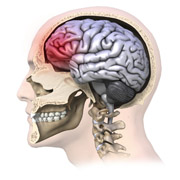Research and Innovation, UNL Office of

Center for Brain, Biology, and Behavior: Faculty Publications
Document Type
Article
Date of this Version
2017
Citation
Published in Archives of Clinical Neuropsychology 32 (2017), pp 259-266.
doi 10.1093/arclin/acw108
PMID: 28431031
Abstract
The Immediate Post-Concussion Assessment and Cognitive Testing (ImPACT) is a computerized neuropsychological test battery commonly used to assess cognitive functioning after a concussion. It is recommended that application of ImPACT utilizes a baseline administration so athletes have an individualized baseline with which to compare post-injury results should they sustain a concussion. It has been suggested that athletes may provide suboptimal effort, called “sandbagging,” in order to return to their baseline cognitive scores, and thus to play, more quickly. This research examines ImPACT baseline scores when high school athletes were asked to attempt to “sandbag,” and compares those scores with scores obtained when they were asked to give their “best effort.” Fifty-four high school student athlete volunteers participated in the study. In contrast to previous research that just looked at the cut-score invalidity indicators built into ImPACT, this research developed a regression equation to predict sandbagging. A logistic regression equation developed with four variables that demonstrated the largest effect size between “best effort” and “sandbagged” baselines showed a 99.7% classification accuracy for the “best effort” and “sandbag” groups.
Included in
Behavior and Behavior Mechanisms Commons, Nervous System Commons, Other Analytical, Diagnostic and Therapeutic Techniques and Equipment Commons, Other Neuroscience and Neurobiology Commons, Other Psychiatry and Psychology Commons, Rehabilitation and Therapy Commons, Sports Sciences Commons


Comments
Copyright © 2016 Kathryn L. Higgins, Robert L. Denney, & Arthur Maerlender. Published by Oxford University Press. Used by permission.